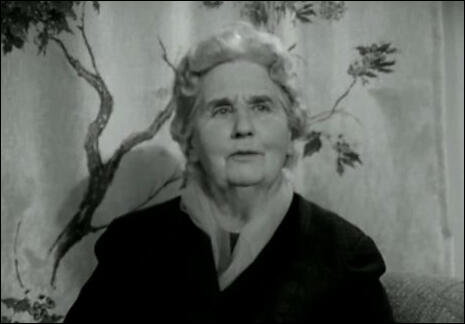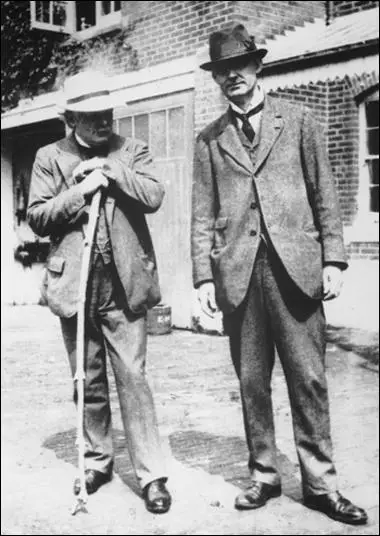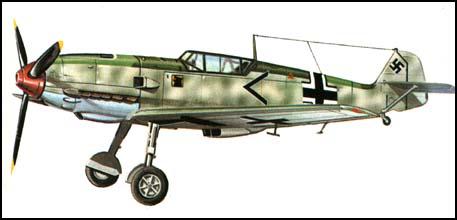On this day on 1st August
On this day in 1885 Grace Row, the daughter of Thomas Henry Roe (1858-1927) and Eleanor Jane Watney Roe (1856-1897) was born in Norwood, Surrey. In the 1901 Census the family was living at 11 Veronica Road, Wandsworth.
Grace Roe's mother died when she was twelve years old and she was sent to boarding school. After leaving Beadles she went to art school.
On 21st June 1908 she heard Emmeline Pankhurst and Christabel Pankhurst speaking in Hyde Park. She later recalled: "It was a bright, sunny day. There was Mrs Pankhurst, this magnificent figure, like a Queen... Christabel Pankhurst had taken off her bonnet and cloak, and was wearing a green tussore silk dress. She was very graceful, had lovely hands and a wonderful way of using them." Although Grace was very impressed with the arguments she heard that day, she did not initially join the Women's Social and Political Union because of press reports that they were "unwomanly women".
Grace Roe continued to go to WSPU meetings and it was after hearing Emmeline Pethick-Lawrence speak at a Queen's Hall meeting in October 1908 that she joined the movement. She had been left a large legacy by her family and so she was able to devote her energies to the cause. Grace was arrested for the first time during a demonstration at the House of Commons on 29th June 1909.
In 1910 Grace was appointed as WSPU organiser in East Anglia. At the time, the WSPU only had one member in the region. Based in Ipswich, Grace arranged for Emmeline Pankhurst, Christabel Pankhurst, Emmeline Pethick-Lawrence and Constance Lytton to speak in the town.
Grace Roe was the organizer at the Bromley and Bow by-election when George Lansbury stood unsuccessfully as a woman's suffrage candidate. In her book, The Suffrage Movement (1931), Sylvia Pankhurst is highly critical of Grace's organisation of the campaign.
In December 1912 Emmeline Pankhurst appointed Grace as deputy to Annie Kenney in London. Kenney was charged with "incitement to riot" in April 1913. She was found guilty at the Old Bailey and was sentenced to eighteen months in Maidstone Prison. Grace Roe now became head of operations in London.
Grace Roe was arrested on 23rd May 1914. She went on hunger strike and was forcibly fed and was still in prison. Mary Richardson wrote a letter about the condition of Grace Roe in The Suffragette: "I was in the next cell to Grace Roe since her conviction and had frequent conversations with her. I consider her the most injured by forcible feeding of any in Holloway… Grace suffers extremely from pain in her nose, throat and stomach all day and night, says she feels as if the tube were always in her body. She says that mentally this is telling on her, and she sometimes feels something would crack in her brain. She anticipates an utter collapse on her release. She is very thin, so thin she can be in no position without positive pain in her bones; she is frightfully anaemic and says her gums are chalk white, and indeed her whole face is."
On 4th August, 1914, England declared war on Germany. A few days later the leadership of the WSPU began negotiating with the British government. On the 10th August the government announced it was releasing all suffragettes from prison. In return, the WSPU agreed to end their militant activities and help the war effort. Emmeline Pankhurst announced that all militants had to "fight for their country as they fought for the vote." Ethel Smyth pointed out in her autobiography, Female Pipings for Eden (1933): "Mrs Pankhurst declared that it was now a question of Votes for Women, but of having any country left to vote in. The Suffrage ship was put out of commission for the duration of the war, and the militants began to tackle the common task." Annie Kenney reported that orders came from Christabel Pankhurst: "The Militants, when the prisoners are released, will fight for their country as they have fought for the Vote."
After receiving a £2,000 grant from the government, the WSPU organised a demonstration in London. Members carried banners with slogans such as "We Demand the Right to Serve", "For Men Must Fight and Women Must work" and "Let None Be Kaiser's Cat's Paws". At the meeting, attended by 30,000 people, Emmeline Pankhurst called on trade unions to let women work in those industries traditionally dominated by men. Grace Row also spoke at these meetings. She also travelled to Newcastle to speak out against labour unrest in the city.
In 1918 Grace Roe went to live with Annie Kenney in St Leonards-on-Sea in Sussex. The two women became followers of Annie Besant, who was the leader of the Theosophy movement in Britain. According to Elizabeth Crawford, the author of The Suffragette Movement (1999), Grace Roe later "remarked on the part played by theosophists behind the scenes of the militant suffrage movement. She made the point that theosophy not only gave a spiritual dimension to their lives but, cutting across class, put people in touch with each other who would have been unlikely otherwise to meet."
Grace Roe remained with Annie Kenney until her marriage to James Taylor and the birth of their son, Warwick Kenney Taylor. In 1921 she went to Canada with Christabel Pankhurst. They eventually settled in Santa Barbara but later moved to Hollywood. Both women became prominent members of the Second Adventist Movement and lectured on the Second Coming. After Christabel and Emmeline Pankhurst decided to run a tea-shop on the French Riviera in 1925, Grace became a social worker in Los Angeles.
After the Second World War Grace opened a bookshop and metaphysical library in Santa Barbara. She stayed in close contact with Christabel Pankhurst and was with her when she died at her home in Santa Monica on 13th February 1958 from a heart attack. Grace was appointed as her literary executor and was responsible for the publication of Christabel's memoirs, Unshackled: the Story of how we Won the Vote.
Grace Row published A Suffragette Story in 1960. She was interviewed by Anna Raeburn for BBC's Woman's Hour in 1968. Six years later she taped an interview with Brian Harrison for the Fawcett Library.
Grace Roe died in 1979.

On this day in 1914 George Riddell reveals in his diary that the Cabinet is divided about declaring war on Germany.
The Cabinet rose at 1.30 and adjourned till 6.30, when it had another long meeting. I was told there were serious dissensions and likely to be several resignations. It seemed that there were four parties in the Cabinet:
(i) The party headed by Asquith and Grey, who thought it vital to support France; (2) the "Peace Party," headed by Sir John Simon, who would not have war at any price; (3) a party headed by Lloyd George in favour of intervention in certain circumstances; and (4) a party headed by Mackinnon Wood and Masterman which was endeavoring to compose the differences between the other three parties with a view to avoiding a split in the Government.
Lloyd George, Simon, Masterman, and Ramsay MacDonald came to dinner at my house. LG said he had been at work for eighteen hours, but he seemed wonderfully fresh. I gathered that John Burns had practically resigned, and that Simon, Earl Beauchamp, Morley and Mackinnon Wood were considering the advisability of doing so.
While we were at dinner, Simon took a paper out of his pocket and, handing it to Lloyd George, said, "Those are my views.” Lloyd George read it carefully and handed it back to him without comment. Simon showed it to me before he left. It was a draft letter of resignation.
A long discussion took place regarding the rights and wrongs of the situation. Lloyd George brought out the official war map and, putting it on the edge of the dinner table, graphically described the position of the various forces. He said that as a compromise the Government had determined to tell Germany that England would remain neutral if Germany undertook not to attack the coast of France or to enter the English Channel with a view to attacking French shipping. He said that if the Germans gave this undertaking in an unqualified manner and observed the neutrality of Belgium, he would not agree to war but would rather resign. He spoke very strongly, however, regarding the observance of Belgian neutrality. I understood Ramsay MacDonald to agree that if Belgian neutrality were infringed, this country would be justified in declaring war upon Germany. He said that he and the Labour Party would resolutely oppose intervention on any other grounds.
LG strongly insisted on the danger of aggrandising Russia and on the future problems that would arise if Russia and France were successful. I suggested that it would be well to let the future take care of itself, and that we had got to think about the present. How should we feel if we saw France overrun and annihilated? In reply, Lloyd George said, "How would you feel if you saw Germany overrun and annihilated by Russia?" I said, "Well, the Germans would have brought it on themselves by their action. The war is due to them. Austria would not have acted as she did if she had not had the support of Germany.” LG said, "Yes, but in 1916 Russia will have a larger Army than Germany, France, and Austria put together. The French have been lending the Russians millions of money for the purpose of constructing strategical railways to carry their armies to the German frontier. These will be completed in 1916. The French papers have been boasting that in that year France and Russia will be able to smash Germany. No doubt the Germans think they must strike before their enemies are ready to annihilate them. No doubt they have been stimulated by extravagant and erroneous reports regarding the state of affairs in Ireland. In fact the Foreign Office are quite convinced of this.”
Simon, who looked very gloomy, said, ‘‘We have always been wrong when we have intervened. Look at the Crimea. The Triple Entente was a terrible mistake. Why should we support a country like Russia?” I said, ‘‘Whether the Entente was a mistake or not, we must act up to our word, both expressed and implied. Furthermore, in a matter of this sort we must brush aside contingencies and problematical situations. We must deal with proximate causes and present dangers. The proximate cause is German aggression and the present danger is the annihilation of France by Germany.” Masterman agreed with me, and we both strongly advocated immediate intervention, to which LG responded by calling us "Jingoes." They left at 11.30 o’clock. It was an exciting day.

On this day in 1940 Adolf Hitler orders Directive No. 17 that begins the Battle of Britain: "The Luftwaffe will use all the forces at its disposal to destroy the British air force as quickly as possible. August 5th is the first day on which this intensified air war may begin, but the exact date is to be left to the Luftwaffe and will depend on how soon its preparations are complete, and on the weather situation."


